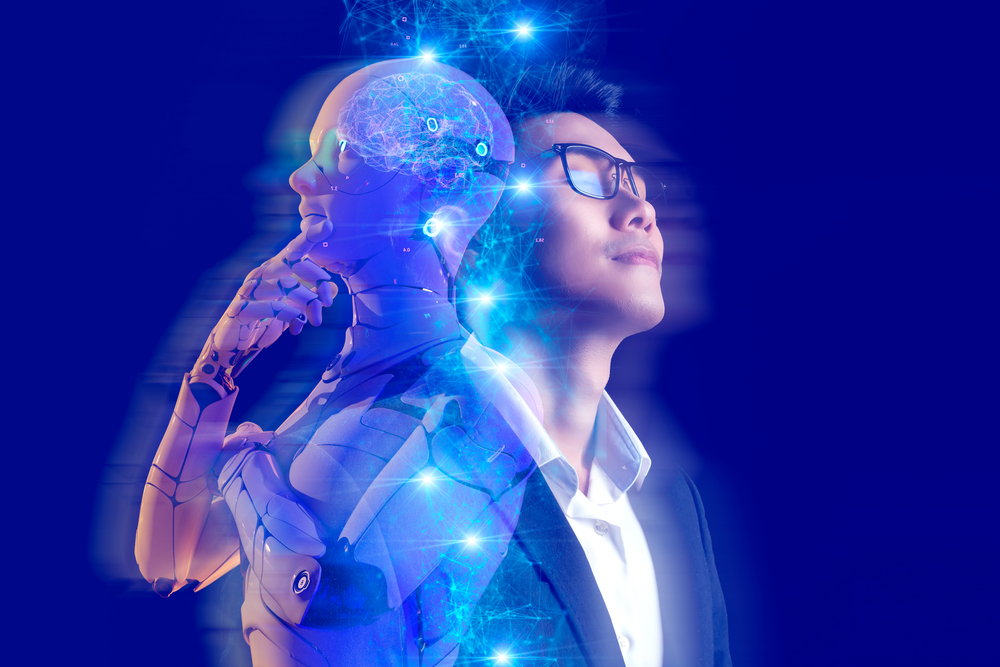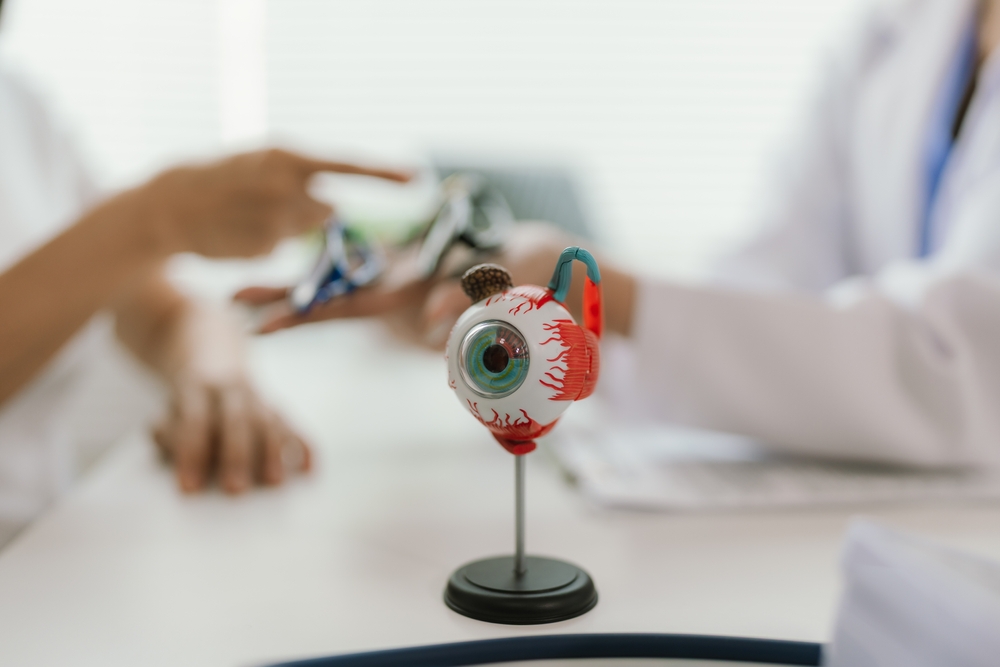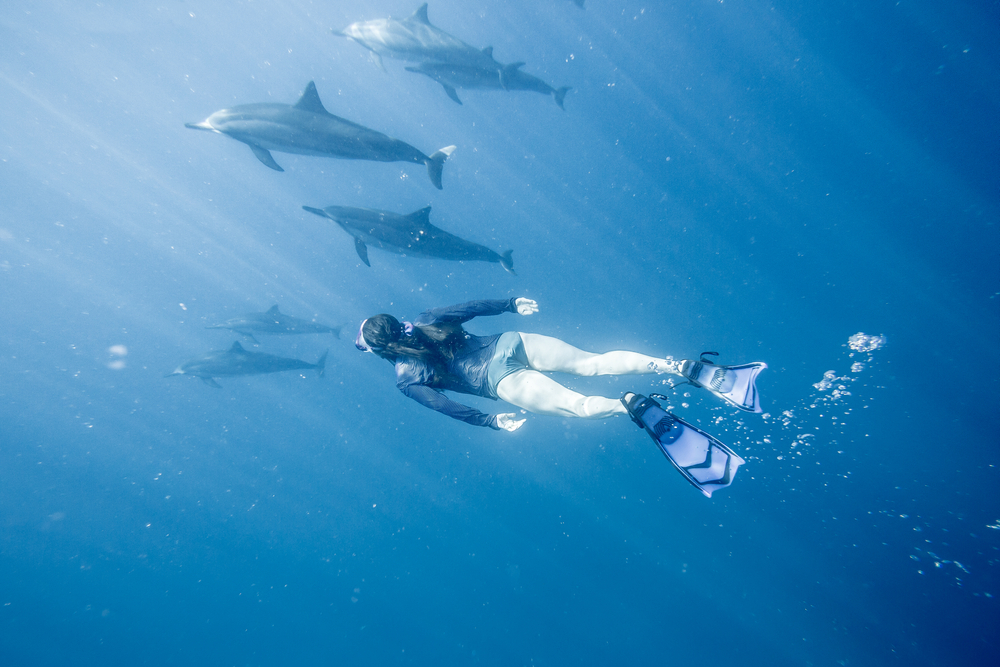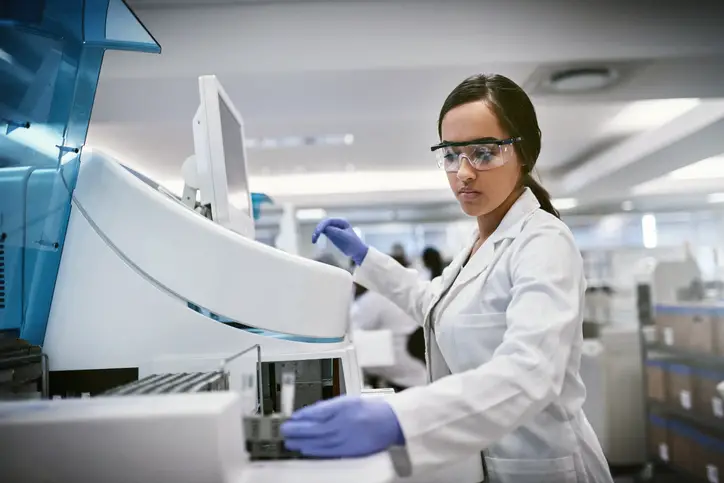In the next 100 years, humanity could undergo some truly wild transformations, driven by technological advances, environmental changes, and new understandings of biology. As we look to the future, it’s fun to imagine how these changes might alter not just our lifestyles, but our very bodies. We could be taller, more resilient, or even able to communicate in ways we can’t currently fathom. Here are 12 intriguing ways humans might physically change over the coming century, blending science fiction with emerging realities.
1. We’ll Be Half Human, Half Bot

The line between human and machine might blur as digital integration becomes more sophisticated. Imagine having data access and communication capabilities directly integrated into your body. Developments in wearable technology and cybernetic enhancements could place the internet at your fingertips, quite literally. This fusion of biology and technology could redefine how you interact with the world.
Digital integration could enhance productivity, learning, and connectivity, making everyday tasks more efficient. However, it also raises concerns about privacy, security, and the potential for technological dependency. Imagine receiving notifications or sending messages without reaching for a device. As thrilling as this sounds, society would need to navigate the ethical and social implications of such profound changes.
2. We’ll Have Enhanced Night Vision

Imagine stepping into a dim room and seeing clearly without fumbling for a light switch. This could be a reality thanks to advances in bioengineering that could enhance human night vision. Scientists are already exploring ways to alter the human eye, possibly by tweaking the retina or introducing special proteins that could allow you to see in the dark. Such developments could drastically change how you interact with the world after sunset.
Night vision could not only be a boon for personal convenience, but it might also revolutionize industries like security and transportation. You might find night shifts a lot more appealing if your vision adapts to low-light conditions. This change isn’t just theoretical; researchers are studying animals with natural night vision to unlock their secrets. Before long, you might ditch your flashlight for good.
3. We’ll Be More Resistant to Diseases

Future humans could become naturally resistant to a range of diseases, thanks to breakthroughs in genetics and medicine. With the progress of CRISPR and other gene-editing technologies, we can imagine a world where hereditary diseases are a thing of the past. Scientists are already working on eliminating specific genes that predispose people to certain illnesses. This could lead to longer, healthier lives, fundamentally altering how you plan for the future.
In a Nature article, experts discussed the potential for gene editing to eradicate diseases like cystic fibrosis and sickle cell anemia. These advancements could extend beyond just hereditary conditions, potentially offering resistance to viral infections or even age-related diseases. Imagine celebrating a 100th birthday while still feeling spry and energetic. The implications for healthcare systems and economies could be enormous, reshaping societies globally.
4. We’ll Be Able To Process Information Faster

Imagine being able to process information at lightning speed and recall every detail with perfect clarity. This could be a reality as neuroscientists delve deeper into understanding and enhancing brain function. Nootropics, brain-computer interfaces, and neurofeedback are just a few of the areas where science is pushing the boundaries of human cognition. As these technologies mature, you might find your mental capabilities expanding in ways previously thought impossible.
Enhanced cognitive abilities could transform education, the workplace, and even your personal relationships. You might grasp complex concepts more easily or solve problems in innovative ways. This could lead to a society where everyone has access to information processing power akin to today’s supercomputers. As exciting as it sounds, this also raises ethical questions about privacy and the nature of intelligence itself.
5. We May Be Able to Breathe Underwater

Imagine a world where people can explore underwater environments without bulky scuba gear. Advances in genetic engineering and biotechnology might make it possible to develop biological adaptations like those seen in aquatic animals. Researchers are already looking into how certain animals extract oxygen from water to apply similar capabilities to humans. This could open up new frontiers in ocean exploration and habitation.
A study published in Science Advances examined how deep-diving animals manage to stay submerged without needing to surface for air. The insights gained are fueling innovative thinking about how humans might adapt similarly. With the majority of the Earth covered in water, the ability to breathe underwater could radically change your interaction with the environment. Imagine weekends spent not at the beach, but beneath the waves, exploring coral reefs and sunken ships.
6. We’ll Be Able to Survive in Extreme Climates

As climate change progresses, humans might develop physical traits to better survive extreme temperatures. Already, some populations have adapted to high altitudes or harsh environments over generations. In the future, bioengineering may accelerate this process, allowing people to thrive in places previously considered uninhabitable. This adaptation could involve changes in skin pigmentation, circulatory efficiency, or even body composition.
Imagine comfortably strolling through a desert without breaking a sweat or enduring polar conditions without layers of clothing. Such changes could have profound impacts on migration patterns and urban planning. Society might start to see new cities emerging in previously extreme climates, transforming global demographics. It’s a reminder of humanity’s incredible resilience and adaptability in the face of environmental challenges.
7. We’ll Communicate Telepathically

While telepathic communication might sound like science fiction, advancements in brain-machine interfaces could make it a reality. Researchers are developing technology that enables direct communication between brains, potentially eliminating the need for spoken language. Such innovations could transform how you interact with others, making communication instantaneous and, arguably, more efficient. However, this raises questions about privacy and the nature of personal boundaries.
The Journal of Neural Engineering has published studies on brain-to-brain communication, demonstrating initial success in transmitting thoughts between people. These experiments, though preliminary, hint at a future where telepathy might be as common as texting. Imagine the possibilities: sharing emotions, thoughts, and ideas without uttering a word. Yet, this leap in communication technology also requires careful consideration of ethical implications and the impact on human relationships.
8. We’ll Have Advanced Self-Healing Abilities

The prospect of self-healing abilities could dramatically change how you approach health and injury. Advances in stem cell research and regenerative medicine are paving the way for your body to repair itself more efficiently. Scientists are exploring ways to activate these processes, potentially allowing for the regeneration of tissues and even organs. This could mean faster recovery times and a significant reduction in healthcare costs.
Imagine recovering from a broken bone in days instead of weeks or regenerating a damaged organ. This self-healing capability could extend your active lifestyle well into your later years. It might also reshape how you view aging and physical deterioration. As exciting as this sounds, the path to widespread self-healing abilities involves complex scientific challenges and ethical discussions.
9. We’ll Be Able to Control Our Metabolism

A future where you can control your metabolism to suit your lifestyle could revolutionize health and wellness. Advances in metabolic research might allow you to adjust how your body processes food and energy. This could lead to personalized dietary plans tailored to optimize health and performance. Imagine indulging in your favorite treats without worrying about weight gain or health risks.
Controlled metabolism could also help address global issues like malnutrition by maximizing nutrient absorption. It might even play a role in managing chronic conditions such as diabetes. However, with great control comes great responsibility, and ethical considerations regarding access and misuse would need to be addressed. The ability to tweak your metabolism could redefine personal health and wellness journeys.
10. We’ll Stand Way Taller

People are likely to get taller over the next century, continuing the trend seen over the last hundred years. Advances in nutrition, healthcare, and living conditions have already contributed to an average height increase in many parts of the world. With more access to balanced diets and better health monitoring from the start of life, future generations could see even greater height gains. However, it’s not all genetics; social factors like urbanization and lifestyle changes also play crucial roles.
According to a study published in eLife in 2016, human height has increased significantly due to improved nutrition and healthcare. The study highlighted that in countries like the Netherlands, the average height is still increasing, suggesting this trend may continue. While not every region will experience the same rate of growth, this height increase could alter social dynamics and even impact architecture and design. Imagine a world where doorframes and public transportation are built for a taller population.
11. We’ll Have More Than Five Senses

In the future, human sensory perception could expand beyond the five traditional senses. Advances in neurology and technology might allow you to experience the world in entirely new ways. New sensory abilities could include perceiving electromagnetic fields or even scent-based communication. This evolution in perception could offer a richer, more nuanced understanding of the environment.
Altered sensory perception could transform industries like art, entertainment, and communication. Imagine enjoying movies and music that cater to enhanced senses, offering deeper emotional and sensory experiences. These changes could also open new realms of creativity and interpersonal connection. While the possibilities are exhilarating, they also pose questions about identity and the nature of human experience.
12. We May Become Immortal

As scientific understanding of aging processes improves, significantly extended lifespans could become a reality. Research into cellular aging and genetic influences on longevity holds the promise of drastically slowing down the aging process. This means you might not only live longer but also maintain vitality well into your later years. Such advancements could lead to new societal structures and redefine what it means to grow old.
Extended longevity could impact everything from career planning to retirement, as you enjoy productive lives far beyond current expectations. Imagine a world where celebrating a 150th birthday becomes commonplace. However, increased lifespans could also bring challenges, such as balancing resources and generational dynamics. The quest for longevity is as much about enhancing quality of life as it is about extending its duration.
